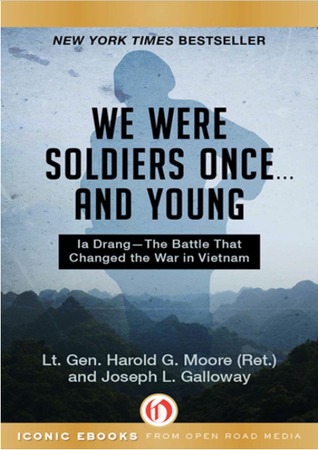More on this book
Community
Kindle Notes & Highlights
is about what we did, what we saw, what we suffered in a thirty-four-day campaign in the Ia Drang Valley of the Central Highlands of South Vietnam in November 1965, when we were young and confident and patriotic and our countrymen knew little and cared less about our sacrifices.
We were the children of the 1950s and we went where we were sent because we loved our country. We were draftees, most of us, but we were proud of the opportunity to serve that country just as our fathers had served in World War II and our older brothers in Korea. We were members of an elite, experimental combat division trained in the new art of airmobile warfare at the behest of President John F. Kennedy.
We went to war because our country asked us to go, because our new president, Lyndon B. Johnson, ordered us to go, but more importantly because we saw it as our duty to go. That is one kind of love.
We discovered in that depressing, hellish place, where death was our constant companion, that we loved each other. We killed for each other, we died for each other, and we wept for each other. And in time we came to love each other as brothers. In battle our world shrank to the man on our left and the man on our right and the enemy all around. We held each other’s lives in our hands and we learned to share our fears, our hopes, our dreams as readily as we shared what little else good came our way.
John F. Kennedy’s young stalwarts of the early 1960s. He told the world that Americans would “pay any price, bear any burden, meet any hardship” in the defense of freedom. We were the down payment on that costly contract, but the man who signed it was not there when we fulfilled his promise. John F. Kennedy waited for us on a hill in Arlington National Cemetery, and in time we came by the thousands to fill those slopes with our white marble markers and to ask on the murmur of the wind if that was truly the future he had envisioned for us.
The country that sent us off to war was not there to welcome us home. It no longer existed. We answered the call of one president who was now dead; we followed the orders of another who would be hounded from office, and haunted, by the war he mismanaged so badly.
Those who were, miraculously, unscratched were by no means untouched. Not one of us left Vietnam the same young man he was when he arrived.
All the names, 305 of them including one Air Force pilot, are engraved on the third panel to the right of the apex, Panel 3-East, of the Vietnam Veterans Memorial in Washington, D.C., and on our hearts. This is also the story of the suffering of families whose lives were forever shattered by the death of a father, a son, a husband, a brother in that Valley.
this story also stands as tribute to the hundreds of young men of the 320th, 33rd, and 66th Regiments of the People’s Army of Vietnam who died by our hand in that place. They, too, fought and died bravely. They were a worthy enemy. We who killed them pray that their bones were recovered from that wild, desolate place where we left them, and taken home for decent and honorable burial. This is our story and theirs. For we were soldiers once, and young.
Lieutenant Charlie W. Hastings, twenty-six, from La Mesa, New Mexico, radioed a special code word, “Broken Arrow,” meaning “American unit in danger of being overrun,” and within a short period of time every available fighter-bomber in South Vietnam was stacked overhead at thousand-foot intervals from seven thousand feet to thirty-five thousand feet, waiting its turn to deliver bombs and napalm to the battlefield.
Among my sergeants there were three-war men—men who parachuted into Normandy on D day and had survived the war in Korea—and those old veterans were shocked by the savagery and hellish noise of this battle. Choking clouds of smoke and dust obscured the killing ground. We were dry-mouthed and our bowels churned with fear, and still the enemy came on in waves.
There never was a time when, in my opinion, some way could not be found to prevent the drawing of the sword. —GENERAL ULYSSES S. GRANT
13
“I don’t dwell on Vietnam, but now and then I hear something or smell something and flash back to those days. I have one very vivid memory of the second morning in X-Ray. We were crawling around under intense machine-gun fire when Sergeant Major Plumley walked up, pulled his .45-caliber pistol, chambered a round, and said: ‘Gentlemen, prepare to defend yourselves.’You never forget a thing like that.”


